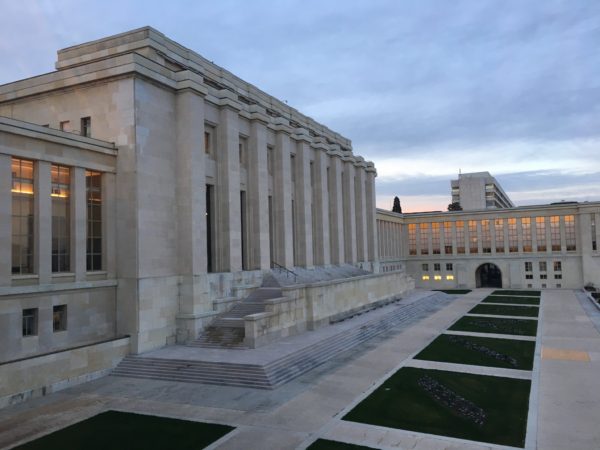Geneva, Switzerland—From 6 to 23 June 2017, Americans for Democracy & Human Rights in Bahrain (ADHRB) participated in the 35th Session of the United Nations Human Rights Council (HRC), highlighting concerns over a variety of human rights abuses being committed by the governments of Bahrain, Saudi Arabia, and other Gulf Cooperation Council (GCC) states. ADHRB delivered 26 oral interventions, held two side events, attended a session organized by the International Labour Organization, and met with several states and UN Special Procedures mandate holders. Many of the concerns raised by ADHRB throughout the session were echoed by UN officials, NGO representatives, and Member States alike.
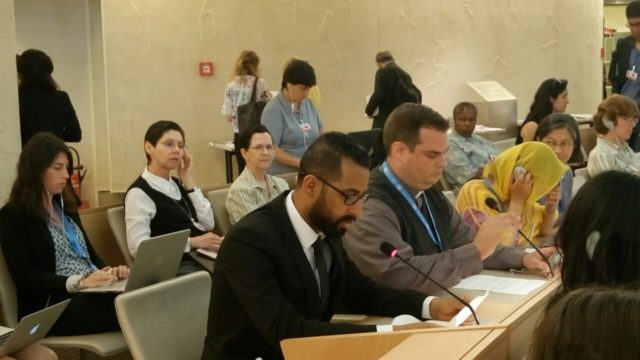
Just before the session began, UN High Commissioner for Human Rights Zeid Ra’ad al-Hussein called on the Government of Bahrain to promptly begin an independent investigation into the death of five peaceful protesters during the 23 May security operation in the town of Duraz. This raid was the third in the area since December 2016. “I urge the Government to investigate the events of 23 May, in particular the loss of lives, to ensure that the findings are made public and that those responsible are held accountable,” High Commissioner Zeid said. He added that he was troubled to learn of reports that those who died were buried without the consent of their families. The raid on Duraz also took place amid a wider, intensified crackdown in kingdom. Citing the “restrictions, intimidation, interrogations, detentions and travel bans” to which human rights defenders are subjected, High Commissioner Zeid continued: “I urge Bahrain to choose a different path—one of engagement and dialogue, as well as accountability for violence, regardless of the perpetrator.”
ADHRB began delivering oral interventions on the first day of the Council, 6 June, starting with a statement made during the Interactive Dialogue with the Special Rapporteur on extrajudicial, summary, or arbitrary executions. Speaking on behalf of ADHRB and the Bahrain Institute for Rights and Democracy (BIRD), Yusuf al-Hoori raised the extrajudicial executions of Sami Mushaima, Abbas al-Samea, and Ali al-Singace in January 2017, in addition to the summary and arbitrary executions of five individuals during the Bahraini security forces’ assault on peaceful demonstrators in Duraz. Since January, Bahraini courts have markedly increased their application of the death penalty, despite handing such sentences down after trials marred by due process violations.
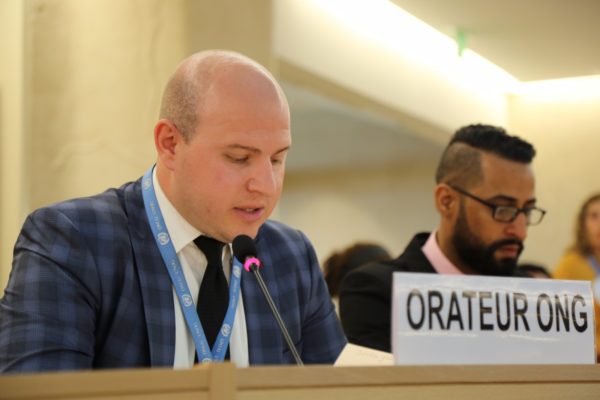 The same day, ADHRB’s International Advocacy Officer Michael Payne spoke on behalf of ADHRB and BIRD during the Item 3 Clustered Interactive Dialogue with the Special Rapporteur on health and the Independent Expert on international solidarity. The intervention highlighted the impact of extended solitary confinement on detainees’ mental health, and raised the issue of health in Bahraini prisons more generally, citing the cases of Nabeel Rajab and Dr. Abduljalil al-Singace.
The same day, ADHRB’s International Advocacy Officer Michael Payne spoke on behalf of ADHRB and BIRD during the Item 3 Clustered Interactive Dialogue with the Special Rapporteur on health and the Independent Expert on international solidarity. The intervention highlighted the impact of extended solitary confinement on detainees’ mental health, and raised the issue of health in Bahraini prisons more generally, citing the cases of Nabeel Rajab and Dr. Abduljalil al-Singace.
On 7 June, ADHRB, along with seven co-sponsors, held its first side event of the HRC session. The event, entitled, “Bahrain Reprisals: Targeting Civil Society for Cooperation with the United Nations,” focused on the worsening trend of reprisals committed against civil society activists for their engagement with United Nations’ bodies and mechanisms. The panel included ADHRB’s Michael Payne, CIVICUS Alliance’s UN Representative Renate Bloem, exiled Bahraini activist Yusuf al-Hoori, Advocacy Director of BIRD Sayed Ahmed Alwadaei, human rights defender Maryam al-Khawaja, and Director of the International Service for Human Rights Phil Lynch. The panelists focused on the escalation of reprisals, noting that while the Bahraini government previously targeted activists themselves, authorities have begun targeting the family members of activists more aggressively as well. A number of panelists described he current situation as being worse than in 2011, and cited the May Duraz raid as Bahrain’s single bloodiest day since the 1990s.
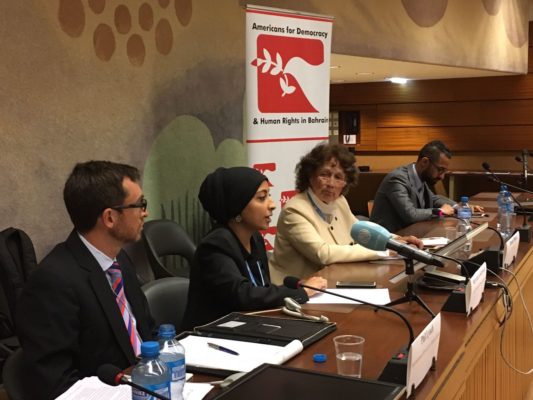 ADHRB and BIRD also delivered two oral interventions on 7 June. The first came during the Item 2 General Debate, during which ADHRB’s Michael Payne expressed deep concern over the Bahraini authorities’ 23 May raid on peaceful protesters in Duraz. This raid, in which security forces killed five individuals and arrested over 200 others, clearly demonstrates the continued use of deadly force by security personnel against those exercising their right to free assembly. The statement also underscored the growing role played by the National Security Agency (NSA) in these deadly police actions, as well as the acutely flawed judiciary and recent expansion of military court jurisdiction. ADHRB and BIRD concluded by echoing the High Commissioner’s call for an independent international investigation into the raid on Duraz, and urging the Council to support this appeal to ensure redress and accountability.
ADHRB and BIRD also delivered two oral interventions on 7 June. The first came during the Item 2 General Debate, during which ADHRB’s Michael Payne expressed deep concern over the Bahraini authorities’ 23 May raid on peaceful protesters in Duraz. This raid, in which security forces killed five individuals and arrested over 200 others, clearly demonstrates the continued use of deadly force by security personnel against those exercising their right to free assembly. The statement also underscored the growing role played by the National Security Agency (NSA) in these deadly police actions, as well as the acutely flawed judiciary and recent expansion of military court jurisdiction. ADHRB and BIRD concluded by echoing the High Commissioner’s call for an independent international investigation into the raid on Duraz, and urging the Council to support this appeal to ensure redress and accountability.
In a second intervention on 7 June, Yusuf al-Hoori spoke on behalf of ADHRB and BIRD and raised the issue of reprisals against Bahraini human rights defenders, including Ebtisam al-Saegh and Sayed Ahmed Alwadaei. Such reprisals –committed in conjunction with the recently re-empowered NSA and military courts and bolstered by broad, vaguely worded counterterrorism laws – have led to Bahrain’s characterization as a police state.
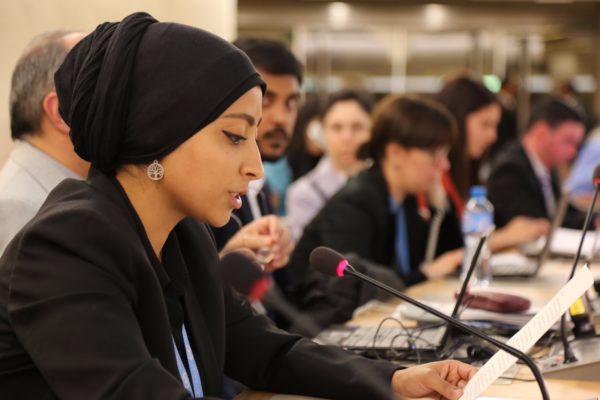 The Interactive Dialogue with the Special Rapporteur on free assembly and association took place on 8 June. Maryam al-Khawaja delivered an intervention on behalf of ADHRB and BIRD, in which she called attention to the Bahraini government’s deadly raid on peaceful protesters in Duraz, as well as the dissolution of the Wa’ad political society. Wa’ad was the last major opposition group remaining in Bahrain after authorities closed the largest opposition society Al-Wefaq last year. The government justifies these recent infringements on the rights to free assembly and association in the name of public order. Contrary to this rhetorical tactic, however, such repressive measures threaten to further destabilize Bahrain if they are not immediately reversed.
The Interactive Dialogue with the Special Rapporteur on free assembly and association took place on 8 June. Maryam al-Khawaja delivered an intervention on behalf of ADHRB and BIRD, in which she called attention to the Bahraini government’s deadly raid on peaceful protesters in Duraz, as well as the dissolution of the Wa’ad political society. Wa’ad was the last major opposition group remaining in Bahrain after authorities closed the largest opposition society Al-Wefaq last year. The government justifies these recent infringements on the rights to free assembly and association in the name of public order. Contrary to this rhetorical tactic, however, such repressive measures threaten to further destabilize Bahrain if they are not immediately reversed.
ADHRB, with seven co-sponsors, held its second HRC side event on 8 June. Entitled “Women’s Rights in Saudi Arabia—Civil Society, Development, and the UN Commission on Women,” the event addressed the potential future role of women in the kingdom’s Vision 2030 plan and proposed changes in the male guardianship system. The panel discussion featured ADHRB’s Pry, Jeremie Smith of the Cairo Institute for Human Rights Studies, Human Rights Watch researcher Adam Coogle, Maryam al-Khawaja from the Gulf Center for Human Rights, Washington-based Saudi women’s rights activist Hala Aldosari, and associate professor at the University of Zurich Elham Manea. Highlighted throughout the event were the recent detentions of women rights activists, including Loujain al-Hathloul, Alaa Anazi, Dina Ali Lasloom, and Maryam al-Otaibi, among others. Several members of the panel also emphasized the fact that while recent reforms and regulatory and legislative steps may address isolated issues, multi-faceted structures continue to systematically impede substantive progress on the promotion and protection of equal rights of women.
ADHRB’s Advocacy Associate Pry also delivered an oral intervention on 8 June on behalf of ADHRB and the Alsalam Foundation. Speaking during the Item 3 General Debate with the Special Rapporteur on poverty, Pry discussed the Rapporteur’s report on his visit to Saudi Arabia. In particular, Pry noted the focus that the report directs to women and the guardianship system, female migrant workers under the kafala system, and poor Shia residents of the Mosawara neighborhood in the Eastern Province town of Awamiyah. The intervention concluded with a question to the Rapporteur regarding the steps he intends to take to follow up on the implementation of the recommendations made in his report.
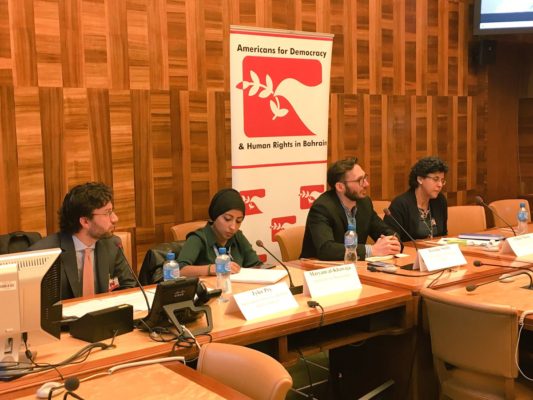 Pry also spoke on behalf of ADHRB and BIRD during the 9 June Interactive Dialogue with the Rapporteur on migrants, in which he highlighted the issue of migrant labor in Saudi Arabia in the context of the United Nations’ 2030 Agenda. This statement also addressed ongoing concerns related to the kingdom’s kafala system of labor sponsorship, including employers’ regular, albeit illegal, confiscation of passports, the withholding of wages, and physical and sexual abuse of workers. The Government of Saudi Arabia, which has not ratified the International Labour Organization’s Domestic Labour Convention, does little to protect the rights of domestic and migrant workers alike, and consistently fails to sufficiently investigate labor abuses.
Pry also spoke on behalf of ADHRB and BIRD during the 9 June Interactive Dialogue with the Rapporteur on migrants, in which he highlighted the issue of migrant labor in Saudi Arabia in the context of the United Nations’ 2030 Agenda. This statement also addressed ongoing concerns related to the kingdom’s kafala system of labor sponsorship, including employers’ regular, albeit illegal, confiscation of passports, the withholding of wages, and physical and sexual abuse of workers. The Government of Saudi Arabia, which has not ratified the International Labour Organization’s Domestic Labour Convention, does little to protect the rights of domestic and migrant workers alike, and consistently fails to sufficiently investigate labor abuses.
In a second intervention on 9 June, Jawad Fairooz, former member of Bahrain’s Council of Representatives and Director of Salam for Democracy and Human Rights, spoke on behalf of ADHRB and BIRD. Addressing the Working Group on Discrimination against Women, Fairooz discussed its recent visit to Kuwait and noted the fact that many issues emphasized in the Working Group’s report are also present in other GCC states. As such, it is appropriate that many of the recommendations made to Kuwait also be proposed to other governments in the Gulf. For example, the experts encouraged Kuwait to pass new legislation promoting independent women’s rights activists. Fairooz noted that such legislation ought to be enacted throughout the GCC, and that these reform efforts must include Saudi activist Loujain al-Hathloul and Bahraini rights defender Ebtisam al-Saegh, who have both experienced recent reprisals by their respective governments in retaliation for their work.
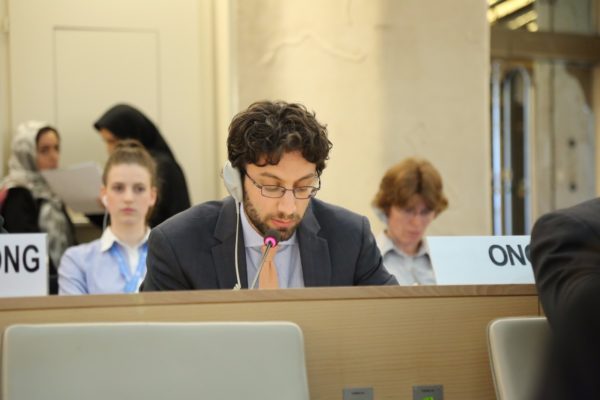 On 12 June, Yusuf al-Hoori delivered an intervention on behalf of ADHRB during the Item 3 Interactive Dialogue with the Special Rapporteur on trafficking. In his statement, al-Hoori echoed the concerns raised by the Rapporteur in her preliminary findings published in response to a recent visit to Kuwait. Specifically, al-Hoori called attention to abuses perpetrated under the country’s continued use of the kafala system, as well as to employer practices that amount to forced labor and often lead to trafficking. These violations are perpetuated by the absence of competent legal and institutional mechanisms, and by the Kuwaiti government’s inability or unwillingness to enforce existing labor protections and minimum wage standards.
On 12 June, Yusuf al-Hoori delivered an intervention on behalf of ADHRB during the Item 3 Interactive Dialogue with the Special Rapporteur on trafficking. In his statement, al-Hoori echoed the concerns raised by the Rapporteur in her preliminary findings published in response to a recent visit to Kuwait. Specifically, al-Hoori called attention to abuses perpetrated under the country’s continued use of the kafala system, as well as to employer practices that amount to forced labor and often lead to trafficking. These violations are perpetuated by the absence of competent legal and institutional mechanisms, and by the Kuwaiti government’s inability or unwillingness to enforce existing labor protections and minimum wage standards.
ADHRB also raised the cases of Loujain al-Hathloul and Ebtisam al-Saegh during the 12 June Interactive Dialogue with the Special Rapporteur on the independence of judges and lawyers and the Special Rapporteur on violence against women. Bahrain in particular has continued to target women human rights defenders, and most recently summoned Ebtisam al-Saegh to the National Security Agency, where she was physically tortured, including through sexual assault. Throughout her seven-hour interrogation, al-Saegh was expressly questioned about her engagement with the Human Rights Council. Also underscored in this statement was Bahrain’s recent constitutional amendment authorizing military courts to try civilians in terrorism cases. Military courts were implicated in gross violation of due process and fair trial rights in 2011.
The next day, Moritz Neubert delivered an oral intervention on behalf of ADHRB during the Interactive Dialogue with the Special Rapporteur on the right to freedom of expression and opinion. Drawing attention to the suppression of both traditional and social media across the Arab Gulf states, Neubert addressed governments’ effective criminalization of online dissent and the sharp deterioration of press freedom. In Bahrain, for example, human rights defender Nabeel Rajab faces up to 18 years in prison for tweets, retweets, and media interviews in which he criticized the government’s use of torture and its role in the Saudi-led coalition in Yemen. The Bahraini Information Affairs Ministry has also indefinitely shuttered Al-Wasat, the kingdom’s last independent newspaper. Since the onset of the intra-GCC crisis, Bahrain’s Interior Ministry has announced that “any show of support for [Qatar] or objection to Bahrain’s actions . . . will be considered a crime punishable . . . [by] a jail term of up to five years.”
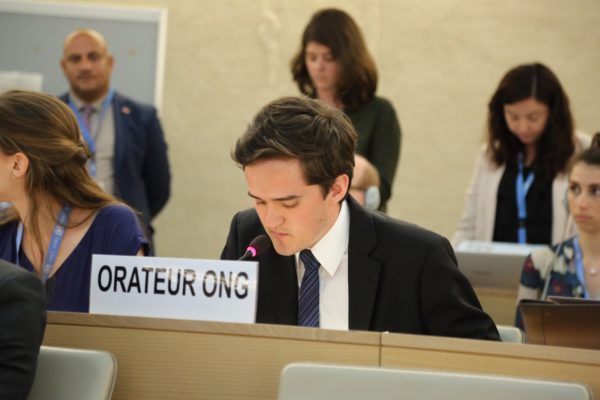 Also on 13 June 2017, ADHRB attended a session of the ILO as it reviewed progress made by the Government of Bahrain toward rectifying outstanding complaints of labor discrimination, implementing the two associated Tripartite Agreements of 2012 and 2014, and generally adhering to international standards for protecting the rights of workers. It found that the Bahraini authorities have largely failed to address these key labor issues: the government has not provided evidence of worker reinstatements in line with the 2014 deal; extended equal worker protections to public sector employees; or undertaken measures to eliminate direct or indirect discrimination and harassment in the workplace in accordance with ILO conventions. Representatives of Bahrain’s chief labor union, the General Federation of Bahrain Trade Unions (GFBTU), as well as international groups like the American Federation of Labor and Congress of Industrial Organizations (AFL-CIO), additionally raised grave concerns over economic reprisals against individuals for expressing political opinions; arbitrary deprivation of nationality resulting in statelessness; abusive conditions for migrant workers; gender-based discrimination; anti-Shia prejudice and preferential recruitment of foreign workers; gaps in the labor law; and the government’s continued refusal to fully adhere to the 2014 Tripartite Agreement. Moreover, it was noted that the government temporarily imposed a travel ban on GFBTU leadership, interfering with the representatives’ ability to travel to the ILO session, and has increasingly undercut the group’s ability to effectively organize. Ultimately, the ILO called on the Government of Bahrain to establish a national plan to eliminate labor discrimination and to expand worker protections, noting that the government’s refusal to provide substantial information on these issues, particularly its implementation of the Tripartite Agreements, undermines its credibility. The ILO concluded that “the fastest, safest, and surest road forward” is for the Bahraini government to ensure equality before the law.
Also on 13 June 2017, ADHRB attended a session of the ILO as it reviewed progress made by the Government of Bahrain toward rectifying outstanding complaints of labor discrimination, implementing the two associated Tripartite Agreements of 2012 and 2014, and generally adhering to international standards for protecting the rights of workers. It found that the Bahraini authorities have largely failed to address these key labor issues: the government has not provided evidence of worker reinstatements in line with the 2014 deal; extended equal worker protections to public sector employees; or undertaken measures to eliminate direct or indirect discrimination and harassment in the workplace in accordance with ILO conventions. Representatives of Bahrain’s chief labor union, the General Federation of Bahrain Trade Unions (GFBTU), as well as international groups like the American Federation of Labor and Congress of Industrial Organizations (AFL-CIO), additionally raised grave concerns over economic reprisals against individuals for expressing political opinions; arbitrary deprivation of nationality resulting in statelessness; abusive conditions for migrant workers; gender-based discrimination; anti-Shia prejudice and preferential recruitment of foreign workers; gaps in the labor law; and the government’s continued refusal to fully adhere to the 2014 Tripartite Agreement. Moreover, it was noted that the government temporarily imposed a travel ban on GFBTU leadership, interfering with the representatives’ ability to travel to the ILO session, and has increasingly undercut the group’s ability to effectively organize. Ultimately, the ILO called on the Government of Bahrain to establish a national plan to eliminate labor discrimination and to expand worker protections, noting that the government’s refusal to provide substantial information on these issues, particularly its implementation of the Tripartite Agreements, undermines its credibility. The ILO concluded that “the fastest, safest, and surest road forward” is for the Bahraini government to ensure equality before the law.
On 14 June, Sayed Yousif Al-Muhafdah of Salam for Democracy and Human Rights spoke on behalf of ADHRB and BIRD during the Item 3 General Debate, in which he addressed the Special Rapporteur on the rights to freedom of peaceful assembly and of association, as well as the Special Rapporteur on extrajudicial, summary, or arbitrary executions. In his full statement and with respect to these mandates, Al-Muhafdah called attention to the Bahraini government’s use of excessive and deadly force against individuals peacefully exercising their right to assemble. He highlighted in particular the raid on Duraz, in which Bahraini police attacked peaceful demonstrators with tear gas and shotguns, killing five and arbitrarily arresting as many as 286, many of whom remain forcibly disappeared.
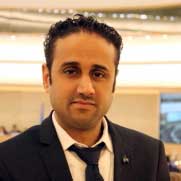 An Item 3 General Debate was also held on 14 June, during which Yusuf al-Hoori delivered an oral intervention on behalf of ADHRB. Al-Hoori discussed the measures taken by the Government of Bahrain to effectively shrink political space, citing last year’s closure of Al-Wefaq and the recent dissolution of Wa’ad. This series of closures has essentially eliminated all space for legitimate political debate and dissent, thereby eradicating any forum for peaceful opposition. Those who have expressed opposition are subjected to judicial harassment, as is made evident by the case of Al-Wefaq’s Secretary General, Sheikh Ali Salman, who is currently serving a four-year prison term on charges stemming from a peaceful political speech. Al-Hoori concluded with a call for the immediate release of all political prisoners, including Sheikh Salman, as well as Al-Wahdawi leader, Fadhel Abbas, who is serving a three-year prison sentence for his group’s criticism of the war in Yemen.
An Item 3 General Debate was also held on 14 June, during which Yusuf al-Hoori delivered an oral intervention on behalf of ADHRB. Al-Hoori discussed the measures taken by the Government of Bahrain to effectively shrink political space, citing last year’s closure of Al-Wefaq and the recent dissolution of Wa’ad. This series of closures has essentially eliminated all space for legitimate political debate and dissent, thereby eradicating any forum for peaceful opposition. Those who have expressed opposition are subjected to judicial harassment, as is made evident by the case of Al-Wefaq’s Secretary General, Sheikh Ali Salman, who is currently serving a four-year prison term on charges stemming from a peaceful political speech. Al-Hoori concluded with a call for the immediate release of all political prisoners, including Sheikh Salman, as well as Al-Wahdawi leader, Fadhel Abbas, who is serving a three-year prison sentence for his group’s criticism of the war in Yemen.
ADHRB’s Pry spoke on behalf of ADHRB and Alsalam during the Item 4 General Debate on 15 June. In his intervention, Pry underscored ongoing violations of the rights to free expression and peaceful assembly and association in both Duraz, Bahrain and Awamiyah, Saudi Arabia. The deadly raids conducted in each community by their respective kingdom’s security forces represent a clear effort on the part of both the Bahraini and Saudi governments to deny their citizens these fundamental human rights.
Chronicling the unprecedented deterioration of Bahrain’s human rights situation since January of this year, ADHRB’s Michael Payne also delivered an intervention during the 15 June Item 4 General Debate. In his statement, Payne recounted the re-empowerment of the NSA, the unlawful execution of three victims of torture, the expansion of military court jurisdiction to civilians, the dissolution of Wa’ad, the lethal raid on Duraz. Despite this course of repression, the Trump Administration has heralded a new era of arms sales and unconditional support.
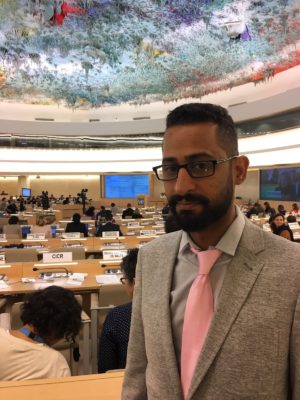 The final oral intervention to be delivered by ADHRB under the Item 4 General Debate was provided by Yusuf al-Hoori and centered on the flagrant abuses persisting in the United Arab Emirates. Extensive anti-terror and cybercrime legislation, in conjunction with pervasive surveillance and forcible disappearance, have enabled Emirati authorities to suppress nearly all forms of dissent, creating one of the most restrictive free expression environments in the world.
The final oral intervention to be delivered by ADHRB under the Item 4 General Debate was provided by Yusuf al-Hoori and centered on the flagrant abuses persisting in the United Arab Emirates. Extensive anti-terror and cybercrime legislation, in conjunction with pervasive surveillance and forcible disappearance, have enabled Emirati authorities to suppress nearly all forms of dissent, creating one of the most restrictive free expression environments in the world.
On 16 June, ADHRB’s Michael Payne spoke on behalf of ADHRB, Alsalam, and BIRD to address before the Item 5 General Debate session the Bahraini government’s failure to substantively cooperate with the Special Procedures of the Human Rights Council. The kingdom has not permitted a single UN Special Procedures mandate holder to enter the country since 2006.
The Item 6 General Debate was held on 16 June. Moritz Neubert delivered an intervention on the escalation of reprisals against Bahraini activists and civil society members engaging with the Human Rights Council, and cooperating with or participating in the UPR process. Highlighted in these comments were the cases of human rights defenders Sayed Ahmed Alwadaei and Ebtisam al-Saegh.
Pry also spoke on behalf of ADHRB and Alsalam under the Item 6 General Debate, highlighting the Bahraini government’s unwillingness to implement its third-cycle UPR recommendations. While many of the 176 recommendations reiterated past concerns that Bahrain has failed to address, others were proposed for the first time, including that those calling for the immediate end to the practice of arbitrary citizenship revocation.
Speaking on behalf of ADHRB, Salma Moussawi delivered an intervention during the 19 June Item 8 General Debate, in which she focused on Bahrain’s disregard for the Vienna Declaration in general, and specifically the kingdom’s failure to promote the equal rights of women. Moussawi concluded her remarks by urging the Bahraini government to take immediate action to end all forms of discrimination against women and to that end, to unconditionally withdraw all reservations currently applied to the Convention on the Elimination of Discrimination against Women.
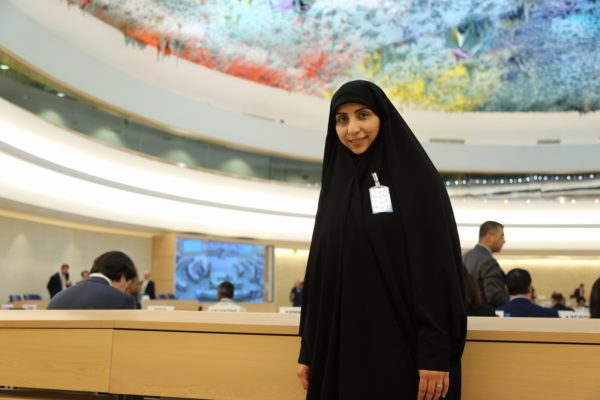 ADHRB also highlighted Bahrain’s failure to uphold the VDPA as such relates to labor rights and the elimination of discrimination in the workplace. A 19 June intervention delivered by ADHRB’s Pry under the Item 8 General Debate raised the issue of Bahrain’s discriminatory mass dismissals of students and trade union representatives in the aftermath of the 2011 pro-democracy movement. Well over half of these works have still not been reinstated, and of those who have, many remain deprived of the full compensation and benefits afforded to them under ILO-backed agreements signed by the Bahraini government.
ADHRB also highlighted Bahrain’s failure to uphold the VDPA as such relates to labor rights and the elimination of discrimination in the workplace. A 19 June intervention delivered by ADHRB’s Pry under the Item 8 General Debate raised the issue of Bahrain’s discriminatory mass dismissals of students and trade union representatives in the aftermath of the 2011 pro-democracy movement. Well over half of these works have still not been reinstated, and of those who have, many remain deprived of the full compensation and benefits afforded to them under ILO-backed agreements signed by the Bahraini government.
Later that day, Salma Moussawi spoke on behalf of ADHRB to address the issue of religious discrimination in Bahrain in the context of the Durban Declaration and Programme of Action (DDPA). The country’s majority Shia community is systematically discriminated against, and remains gravely underrepresented in the police and security forces, as well as in political spaces and the judiciary. She additionally specifically raised the government’s persecution of Shia religious leaders like Ayatollah Sheikh Isa Qassem, who was arbitrarily stripped of his citizenship, and the violent raids on his hometown of Duraz.
Pry also discussed DDPA noncompliance and religious intolerance in Saudi Arabia. In the Item 9 intervention, he pointed to the government’s structural discrimination of the Shia minority community in the areas of education, employment, law, and religious expression. However, Pry also highlighted the discriminatory military operation and de facto siege of Saudi Arabia’s Shia-majority Eastern Province city of Awamiyah. Since 10 May, at least five civilians have been killed and hundreds more continue to be forcibly evicted with no provision of alternative housing or compensation.
 On 21 June, Pry delivered an Item 10 intervention on behalf of ADHRB in which he called upon Saudi Arabia to publicly recommit to, and expand technical cooperation with OHCHR. With a view toward bringing the kingdom’s judiciary in greater accordance with international standards, OHCHR provided training in due process and fair trial guarantees to Saudi judges and lawyers. At the conclusion of this program, however, the judicial system continues to be marred by the perpetration of significant violations, including the denial of the right to counsel, admission of coerced confessions as evidence, and the use of torture.
On 21 June, Pry delivered an Item 10 intervention on behalf of ADHRB in which he called upon Saudi Arabia to publicly recommit to, and expand technical cooperation with OHCHR. With a view toward bringing the kingdom’s judiciary in greater accordance with international standards, OHCHR provided training in due process and fair trial guarantees to Saudi judges and lawyers. At the conclusion of this program, however, the judicial system continues to be marred by the perpetration of significant violations, including the denial of the right to counsel, admission of coerced confessions as evidence, and the use of torture.
Speaking on behalf of ADHRB, Alsalam, and BIRD, Salma Moussawi delivered a second intervention under Item 10, in which she discussed the topic of states’ technical cooperation with OHCHR. Although full and transparent cooperation—whereby missions are granted the space and mandate to genuinely conduct their work—is a welcome development, governments must not pursue collaboration or assistance with the purpose of instituting superficial reform or whitewashing their human rights records.


